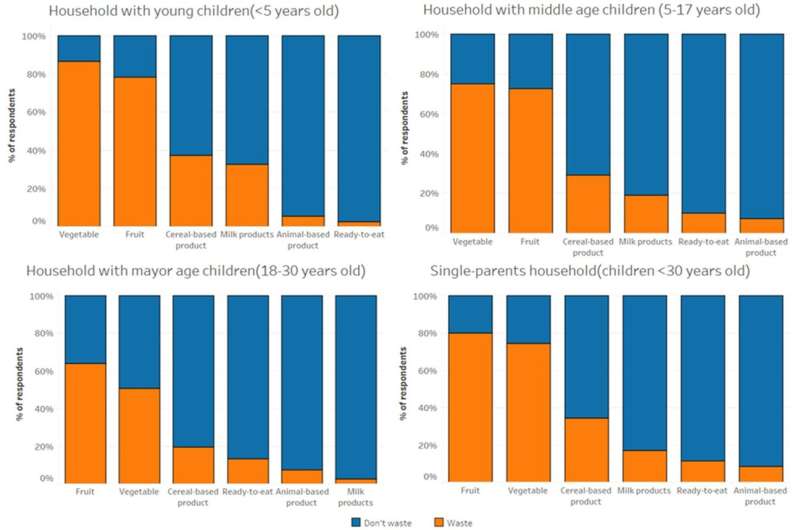This article has been reviewed according to Science X's editorial process and policies. Editors have highlighted the following attributes while ensuring the content's credibility:
fact-checked
peer-reviewed publication
trusted source
proofread
70% of households with children regularly waste food, finds Spanish study

Seven out of ten Spanish households regularly waste food, according to a recent study by the Institute of Environmental Science and Technology at the Universitat Autònoma de Barcelona (ICTA-UAB). This study analyzes the amount of food discarded by families, especially those with children, and links this serious social issue to the socioeconomic characteristics of the family unit.
The results, published in the journal Frontiers in Nutrition, indicate that families with young children and teenagers are the ones who waste the most food, while single-parent families and those with adult children waste the least.
Based on a survey of 800 Spanish households, the study found that perishable food items such as vegetables (80%), fruits (78%), and cereal-based products (63%) are the most wasted, followed by dairy products (25%), which are discarded more frequently in homes with small children. Animal-based products like meat, fish, and eggs, along with pre-cooked products, are the least wasted.
Food spoilage is the main cause of food waste, primarily due to an inadequate food management, leading to frequent small amounts of waste and the over-purchase of perishable items that end up in the trash before being consumed.
The typical shopper profile is a woman (70% of cases), under 54 years old (79%), who works full or part-time (78%) and spends an average of 537 euros per month on food. Half of the families shop at supermarkets and hypermarkets, and two out of three households make a single shopping trip per week, supplemented by smaller purchases throughout the week.
Regarding food consumption behavior, 66% of families report consuming fresh products at home daily, while almost all families consume animal products more than four days a week. However, 84% of families admit they do not cook every day.
Household type and shopper's age are other crucial factors in analyzing this phenomenon. Households with small children are more likely to waste food, possibly due to the difficulty of meeting their dietary needs and managing food quantities and portions adequately.
To reduce the amount of food that ends up in the trash, researchers highlight the need to plan shopping trips and create a shopping list before going to the market or supermarket. The results indicate that 70% of families do it.
"Detailed meal planning, checking the food we already have at home, making shopping lists, freezing food to prolong shelf life, and repurposing of leftovers allow for less waste," says Pietro Tonini, ICTA-UAB researcher and lead author of the study.
Households that reported buying their food from small shops and municipal markets tend to waste less food than those who shop at supermarkets or hypermarkets. Certain types of packaging, discounts, and persuasive marketing with offers such as 3-for-2 in large stores lead to over-purchasing.
"The presence of ultra-processed foods in supermarkets, such as unhealthy snacks, frozen pizzas, flavored ice creams, and yogurts, induces unnecessary purchases," adds Tonini.
To address this issue, researchers call for educational public policies aimed at families that advocate for waste reduction, such as school awareness campaigns about the social and environmental impact, and the promotion of healthy habits and diets based on local and seasonal products.
In addition to promoting good practices like repurposing leftovers, Pietro Tonini highlights that some tools and online applications help manage the list of most-consumed foods and plan shopping more efficiently. "Involving children in meal planning and food preparation can also have a positive impact," he notes.
Another useful public policy in the fight against food waste would be to encourage the sale of bulk products, while implementing separate collection of organic waste in neighborhoods with high percentages of households with children to improve waste management and reduce greenhouse gas emissions.
More information: Pietro Tonini et al, Predicting food waste in households with children: socio-economic and food-related behavior factors, Frontiers in Nutrition (2023). DOI: 10.3389/fnut.2023.1249310
Journal information: Frontiers in Nutrition
Provided by Autonomous University of Barcelona



















